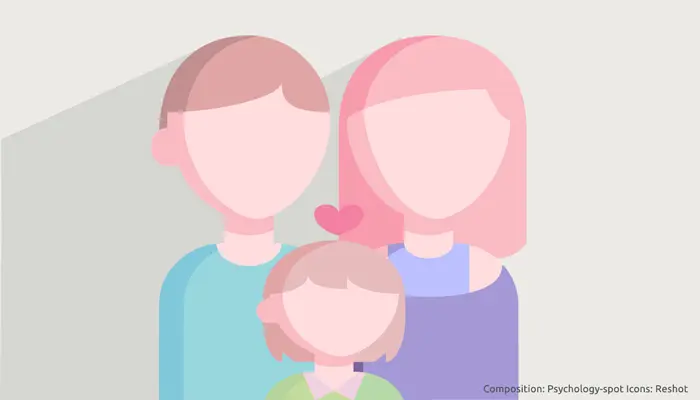
Forgiveness is key to finding peace after a painful situation. Whether we’ve been lied to, humiliated, cheated on, or hurt in some way, forgiveness is liberating because it helps us turn the page. Holding a grudge, on the other hand, keeps us tied to a situation that hurts us. However, the bigger the affront, the greater the pain and the closer the person, the more difficult it is for us to forgive. For this reason, forgiving a father or mother who harmed us can be an arduous task that forces us to face our shadows.
The deep emotional mark left by our parents
The treatment and education we receive from our parents marks our lives forever – whether we want it or not, whether we recognize it or not. The way we were treated when we were little and the relationship we had influenced our personality, shaping our dreams and fears.
Unfortunately, childhood is not always that rosy happy period. You may have grown up with overly rigid and strict parents who continually criticized you and told you what to do, and if you didn’t abide by their rules, they subjected you to punishments that were totally disproportionate. Or maybe your parents were neglectful, neglecting you because they worked too much or hung out at the bar so much that they didn’t spend quality time with you and you used to feel abandoned, lonely and unloved.
Or maybe they fell into parental overprotection, so they didn’t let you do anything, made decisions for you, and pushed you down a path you wouldn’t have freely chosen, turning you into a fearful and insecure adult. It may even be that your parents were emotionally unstable and treated you very unfairly, pouring out all their dissatisfaction, frustration and anger on you, humiliating you or mistreating you physically and psychologically.
There are a thousand and one reasons to feel hurt – and it’s perfectly understandable. Many families experience painful situations that generate great suffering, especially for the most vulnerable, who are usually young children. When those conflicts are not resolved, but are swept under the rug, they end up becoming an “elephant in the room” that not only affects the bond with parents, but can surface in relationships with other people and, obviously, will prevent you from finding the emotional stability and inner peace you need to move on.
We cannot be at peace with ourselves if we are at war with our parents. We cannot become the person we could be if we continue to carry the traumas of childhood. As simple as that.
Deciphering the maze of emotions that prevents us from forgiving a mother or father
Forgiving a father or a mother is particularly difficult because you can feel too hurt, abandoned, deceived or frustrated. And the person who generated all that is precisely the one who was supposed to love, protect and take care of you. It is possible that when you look back, it is difficult for you to process all those painful experiences, so that act of remembrance often generates even more frustration, anger, resentment and even hatred. You are absolutely right to feel deeply betrayed and disappointed.
In fact, another obstacle to forgiving a mother or father is precisely that many of these experiences have a strong emotional imprint. It is likely that you have not consciously processed them, so their memory generates a true emotional tsunami. Perhaps you can’t even put them into words, which prevents you from assuming the psychological distance that forgiveness demands. In that case, you literally get caught up in the emotions you experienced as a child who felt alone, powerless, sad, humiliated…
Sometimes – we must also admit it – it is difficult for us to forgive a mother or father due to the expectations we have of them. Sometimes, we still wait – in the depths of our unconscious – for that father or mother to change and finally give us the love, support and understanding that we miss so much. In that case, forgiving them would practically amount to giving up that illusion. It would be like accepting that, simply, in the distribution of life we have had parents who are far from ideal.
In fact, in many cases, the difficulty in forgiving parents may lie in our sense of justice and the need to win the “last battle.” Some people think that if they forgive their parents, it’s like they got away with it.
Of course, it’s understandable that you’ll have a hard time moving on if you don’t get a sincere apology. It is difficult to forgive certain things if the parents do not admit that they were wrong and deny the damage they have caused you. In fact, it is curious that in many cases the vision of the parents does not coincide with that of the children. Sometimes it’s like they were two different stories. That divergence may be due to a “defense mechanism” by which parents try to convince themselves that they didn’t do too badly. Other times it is because they are not fully aware of how much damage and pain they have caused.
Obviously, the discordant version of the parents generates even more irritation in the children and becomes a further barrier to forgiveness. It is difficult to forgive someone who does not assume responsibility. If the apology never comes, it is likely that your relationship with them remains tense and full of latent conflicts that continually generate arguments.
However, in this way life continues while you remain trapped in those painful experiences of childhood or youth. Life goes on and you keep accumulating anger and resentment, with the secret hope that your parents will be the ones to free you of that weight.
As an adult, you must keep in mind that you are 100% responsible for your life, which also means transforming the emotional legacy left by your parents. It is not always possible to receive an apology from an abusive father or an unstable mother – either because they do not recognize the damage done or because they are not physically by your side – but forgiving them does not mean exonerating them from their responsibility, it means that you have the right to live without that weight. And that’s a step worth taking… When you’re ready.




Leave a Reply